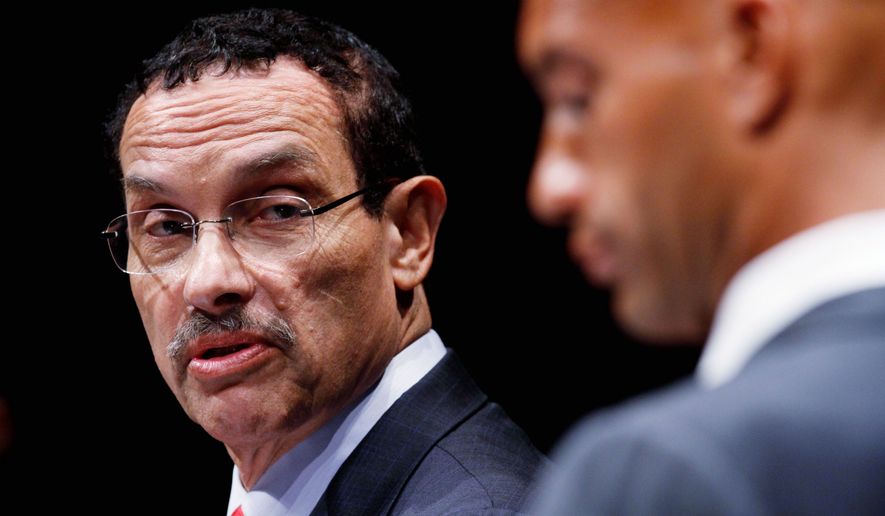The three leading candidates seeking the Democratic Party nod to be the next mayor of Washington are black, yet the issue of race and racial divisions remains an inescapable theme in the campaign as voters prepare for Tuesday’s primaries.
Polls show a deep racial divide in the electorate, with the city’s minority white population strongly favoring Mayor Adrian M. Fenty and blacks swinging toward D.C. Council Chairman Vincent C. Gray. Mr. Gray is seen as the front-runner in the race.
The third-place Democrat in the primary, Leo Alexander, said Monday that race will remain a huge issue in the predominantly black city until D.C. leaders address the “blatantly obvious” problems linked to abject poverty.
Mr. Gray injected the race issue into the campaign again Monday, telling reporters that Mr. Fenty’s Cabinet does not reflect the racial makeup of the city “by virtue of his own appointments.”
Mr. Gray then noted that the top three positions in public education — the deputy mayor for education, the schools chancellor and the school superintendent — as well as the police chief, fire chief and attorney general, are not black.
“How can there not be one African-American leader in that cluster?” Mr. Gray asked.
Fenty campaign spokesman Sean Madigan was unavailable for comment. A message left for him at campaign headquarters was not returned.
Mr. Fenty, who has struggled to connect in the campaign with voters in heavily black wards of the city, has said repeatedly while campaigning that he makes appointments based on individual qualifications, not race.
In recent debates that have been widely broadcast on TV, radio and the Web, Mr. Fenty also has stressed that he bears some responsibility if some segments of the city feel they haven’t had a seat at his decision-making table.
“Some people feel left out,” the mayor said at a forum sponsored last week by The Washington Post. “I bear some responsibility. I’ve got to do a better job.”
The mayor cites the new and newly renovated schools, libraries and recreation centers that were built east of the Anacostia River, where the mostly black population faces jobless rates that are two to three times higher than the citywide rate of 9.8 percent.
But Mr. Fenty’s outreach still has left him trailing in the polls in his quest for a second four-year term, and the surveys of Democratic voters reveal a yawning racial gap.
According to a Clarus telephone poll of 501 Democrats conducted Aug. 15-16, Mr. Fenty had a 42-percentage-point lead among whites, while Mr. Gray had a 38-point lead among blacks. Mr. Gray was elected to the D.C. Council in 2005 and became chairman two years later.
The polls also reveal a stark racial divide in favorability ratings for the two lead candidates. Mr. Gray is viewed favorably by 70 percent of the city’s blacks, but by just 39 percent of the city’s white voters. In contrast, Mr. Fenty’s favorability rating is much stronger among whites (63 percent) than among blacks (33 percent).
Mr. Alexander, a television broadcaster and businessman, argues that the race issue is also a class-based division, juxtaposing the District with the situation in New Orleans.
“Race continues to be an issue because the income gap is so wide and the educational achievement gap is so wide,” he said. “Everything is so blatantly obvious” in some neighborhoods.
“D.C. is not like New Orleans, a checkerboard, where you have one [neighborhood] block that’s great and one block poor, then one block great,” he said. “In D.C., you have entire sections of the city where residents are living in abject poverty. Unless we create a pathway to moving people from government sufficiency to self-sufficiency, race is a problem.”
Mr. Alexander cited poverty as the root cause of the race and class divisions, and said Hispanics are the “new people on the block being exploited” by politicians.
“Hispanics and other immigrants are being exploited,” he said. “Crime and higher taxes are widening the economic gap.”
• Deborah Simmons can be reached at dsimmons@washingtontimes.com.




Please read our comment policy before commenting.